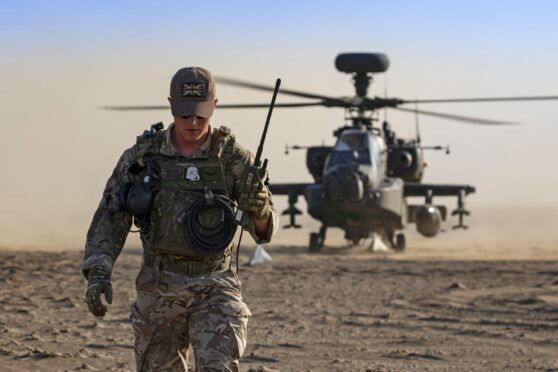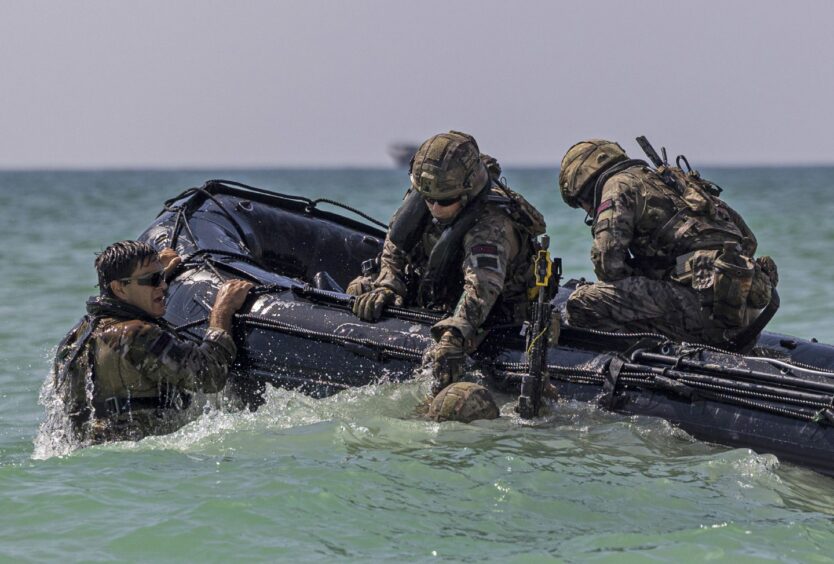
Scots soldiers are leading a new UK offensive to build links with Oman, we can reveal, despite persistent concerns over the country’s human rights record.
Troops from the Royal Regiment of Scotland are heading the UK’s regional hub in the controversial Middle Eastern nation.
Under the British Army’s “Future Soldier” strategy, the Royal Highland Fusiliers are among the first soldiers to deploy to Oman for unit training, partnered exercises, and to provide a “persistent engagement force”.
However, the move comes after the US Government raised concerns over significant human rights issues there.
The State Department’s report on human rights, published in 2021, revealed significant concerns in the country based on “credible reports” of arbitrary arrest and detention; outlawing of homosexuality; restrictions on the internet, free expression and media; interference with the rights of peaceful assembly and freedom of association; serious restrictions on political participation and the exploitation of foreign migrants.
Khalfan al-Badwawi, a human rights campaigner who left Oman after being targeted by police, said the Army has been enlisted to bolster UK links with Oman where UK firms have interests in oil, gas and infrastructure.
He said: “British imperialism, in alliance with its reactionary agents, suppressed a popular democratic revolution influenced by progressive Marxist ideas during the sixties and seventies. Today, Oman is a completely restricted and controlled environment through the Anglo-Sultan regime, despite two major popular uprisings in the last decade.
“The people live under bad economic conditions and a huge gap in equality, where unemployment, lay-offs and bad debts prevail. The tyrannical situation in Oman is to preserve the interests of the ruling elite and British capitalism allied with the reactionary elite.”
The Army plans to have a more enduring presence overseas. Through three hubs in Germany, Oman and Kenya, the Army aims to “extend our influence and support the prosperity agenda”. Under the plans, the Army will concentrate the training of its heavy war-fighting units of tanks and infantry in Oman.
The Sultanate of Oman is a hereditary monarchy ruled since January 2020 by Sultan Haitham bin Tariq Al Said. He has sole authority to enact laws through royal decree, although there is a parliament with elected representatives. Sultan Haitham’s brother – Shihab bin Tariq Al Said – serves as deputy prime minister for defence.
The military expansion in Oman supports Project Khanjar, a joint effort between the British military and the Omani government to develop the Ras Madrakah area into a leading regional military training centre.
According to the British Army website, Exercise Desert Khanjar is the country’s “first persistent engagement deployment since the publication of the British Army’s Future Soldier strategy”. Through partnered exercises, it will aim to provide a “regionally forward-based persistent engagement force”.
Lieutenant General Sir Ralph Wooddisse, Commander Field Army, previously said: “This is probably our strongest relationship in the region, if not the world, in many respects.
“My father fought with the Omani Army in the 1960s and I’ve been coming backwards and forwards to Oman throughout my career and that is representative of the strength of the relationship between our two nations.”
During the Oman deployment, the Ministry of Defence said troops would undertake basic and specialist training, sports, adventurous training, and cultural and educational visits.
The UK’s 4th Light Brigade Combat Team known as The Black Rats, based around the 2nd Battalion, The Royal Regiment of Scotland Light Mechanised Infantry Battlegroup, spearheads the operation. But human rights campaigners called for a law change to make sure British soldiers and military resources were not being used to prop up repressive regimes such as Oman.
Naomi McAuliffe, Amnesty Scotland’s director, said: “Serious human rights violations persist in Oman. It is a country that retains the death penalty, denies women their full rights, and exploits migrant workers, and where the military and security forces are directly involved in the repression of protest, often with arrests and use of force, including the misuse of tear gas.
“There are significant concerns about the conduct of police and security officials in Oman, and the UK Government should provide assurances that stringent human rights assessments have been carried out to ensure UK training does not contribute to human rights violations.”
The Ministry of Defence said: “The UK and Oman have many shared interests and ambitions across political, economic, social and security matters. We rely on our partners in the Middle East for the safety and security of the UK and our citizens. Our strong relationship enables us to have direct conversations on sensitive matters, including human rights.
“Further investment in Oman and increased deployments to the country and the region demonstrate our long-term commitment to the Gulf’s stability and prosperity while protecting our interests in tackling the upstream drivers of terrorism.”

Enjoy the convenience of having The Sunday Post delivered as a digital ePaper straight to your smartphone, tablet or computer.
Subscribe for only £5.49 a month and enjoy all the benefits of the printed paper as a digital replica.
Subscribe © UK MOD Crown copyright
© UK MOD Crown copyright